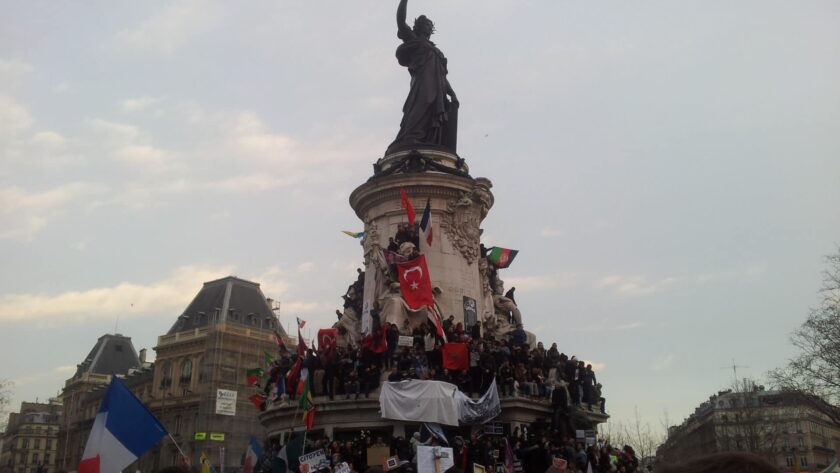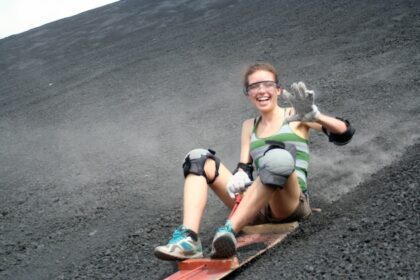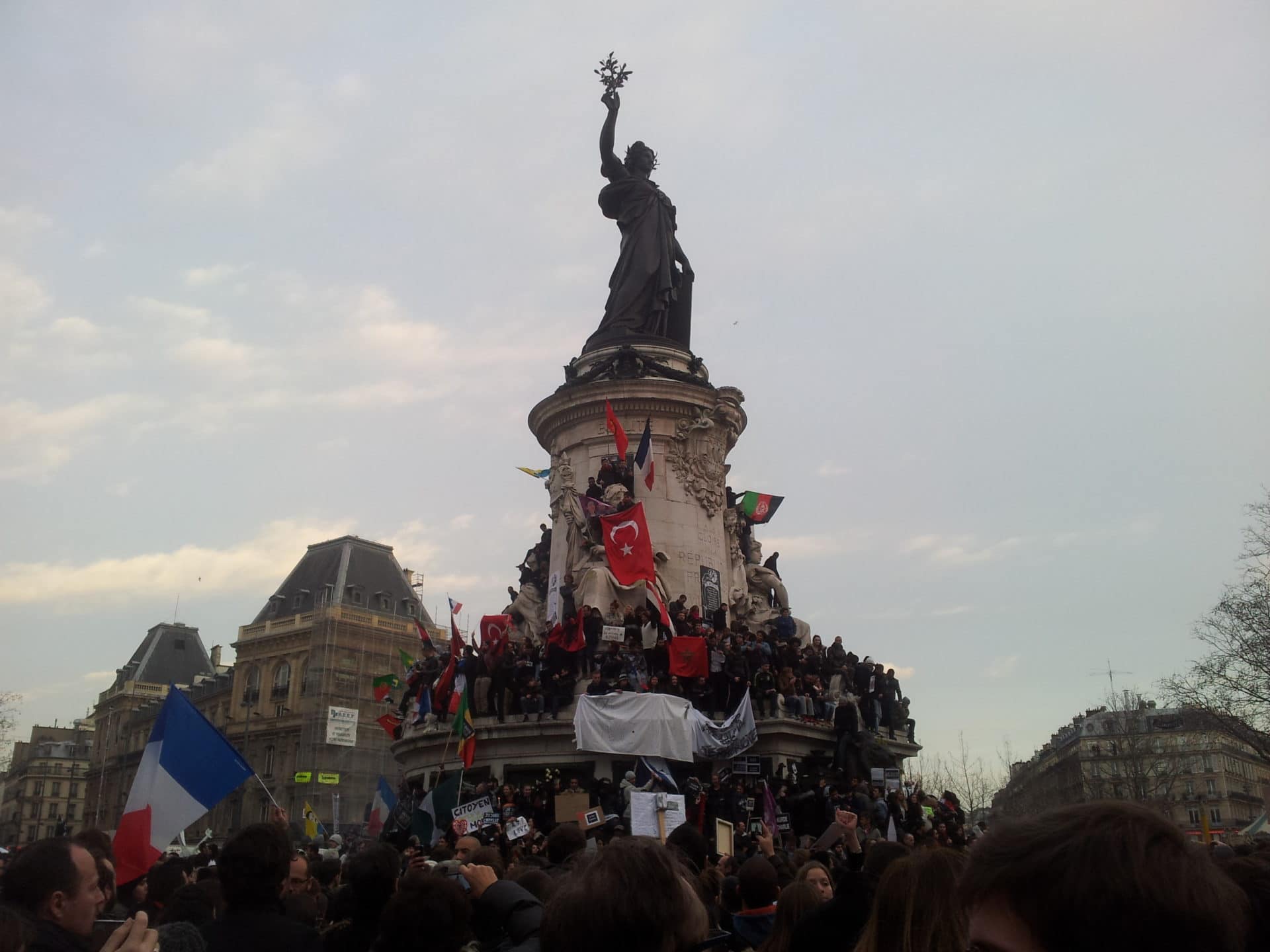
Paris, to me, is a city that always feels like itself. Even as it changes, it always feels the same, au fond, deep down. But what do I know? I’ve only lived here eight years.
I’m not French, not Parisian, and likely never will be. France isn’t in my blood, but it’s in my spleen, my heart, my liver, and all those other organs the French like to attribute with properties they may or may not have.
En gros, I’m a fan. And this is my story, my history, of Paris.
The June Uprising: My First French Revolution
When I first arrived in France, I was disappointed.
There, I’ve said it. Even though today, I make fun of those who imagine Paris to be what it’s not — men in berets on bikes with baguettes, playing accordions and drinking wine morning, noon, and night — I’ll admit that I showed up with expectations, albeit different expectations, and they were dashed.
Most girls show up in Paris hoping to be seduced on the Pont des Arts, chauffeured around the quais de Seine on the back of a moto-scooter, kissed in the Tuileries while the sun sets behind the Arc du Carrousel. Most, it goes without saying, end up utterly disappointed.
I, meanwhile, mourned an impression of France, the country I thought it would be. It was an impression I got from a song that was inspired by a book written by a Frenchman in exile, a song that came from an operetta composed by the English.
In 2007, I was expecting to arrive in Enjolras’ Paris. An unfairer expectation could not have existed.
My connection with Les Misérables is something that’s followed me throughout my life, the thread of a history that starts with one of my favorite stories. In it, my parents, two days before I was born, went to see the show on Broadway, and my mother’s feet were so swollen that she had to wear her father’s shoes. My vain German grandfather walking down New York City’s sidewalks in argyle socks is a sight I wish to this day I’d seen.
I went back to that theater ten years later; this time I was somewhat more cognizant. I didn’t know enough about French history to be able to place or explain any of the events that were being acted out before me, but “Red and Black” still left me in tears. Still leaves me in tears, no matter who sings it.
It’s not surprising that when 15 years later I had to pick a literature thesis topic, Victor Hugo was on my list — 19th century Paris, for me, was the only place that I could find the values of the French Republic, easy to perceive through fiction. Today’s French motto, liberty, equality, fraternity, was once written liberty, equality or death; that was what Victor Hugo was showing me — people who were willing to die for Republican values, for their Republic.

I went from fan to fanatic, dragged my poor boyfriend to see Les Misérables in the theater and covertly pointed out all the mistakes. The more I learned, the more I mourned a Paris I was sure I would never see, but this time, I realized I wasn’t missing out on fiction but on an old reality that had fizzled with time. Romanticized, of course, but Enjolras’ Paris, Hugo’s Paris, a Paris that wanted something so badly it was ready to die for it — a senseless death like that of the June Rebellion — was not the Paris I lived in.
While I’m well aware that Patriot anti-Loyalists aren’t wandering my hometown either, the American Revolution doesn’t seem quite as dead and buried. Case in point: my boyfriend’s first shock upon arriving in America were the flags. “You’re so nationalistic,” he said.
“Patriotic,” I corrected, though the nuance meant nothing to him yet. In today’s France, I’ve found, the words are nearly synonymous. I had never seen anyone fly a French flag unless they worked at a prefecture — until this year.
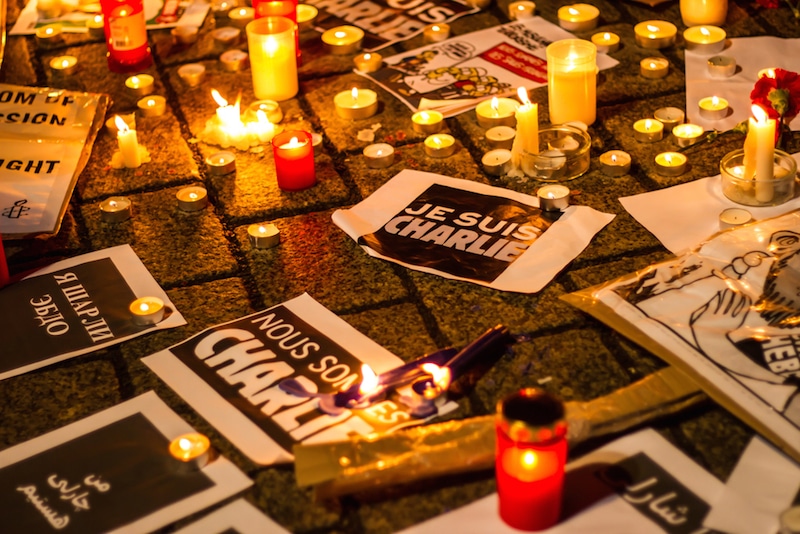
Charlie Hebdo: The New “Where Were You?”
I was 14 when two planes hit the Twin Towers in my hometown. Echoes of news reports still reverberate in my brain; I can repeat, “Another plane… has hit… another building” in exactly the tone being used by the journalist we were watching, crammed into the English classroom as we saw the second tower fall. September 11th was my generation’s “Where were you?” Our event — like JFK being shot or Apollo 11 landing on the moon. It was also, at 14, the first time I became truly aware of the world around me.
I wondered for weeks afterwards when things would go back to feeling “normal;” the short answer is that they never did.
I didn’t think that something else could shake me that hard again; after all, I’d already been shaken. On January 7th, 2015 — the day two armed Islamic terrorists forced their ways into the offices of Charlie Hebdo, a French satirical newspaper and fired 50 shots, killing 11 and injuring 11 more — I was proved wrong.
I was at work this time, but the series of events followed the same pattern. Instead of switching channels on the tiny TV in my childhood bedroom, I covertly followed Twitter feeds and listened to France 2 news through my work headphones, clicking over to the BBC now and again. Friends from home sent messages, via Facebook instead of AIM — “Are you all right?” “What’s going on?” These same friends asked me to buy the next issue of the paper, which people said would still be coming out the next week. Friends who had never heard of Charlie Hebdo, foreigners rallying for a cause they didn’t understand. How could they? I had been living here for years, as “integrated” as they come, and I didn’t understand.
That night, I watched the gatherings at Place de la République from afar, not sure where I should be.
But it wasn’t until the following Sunday that I felt the full effect of what had happened.
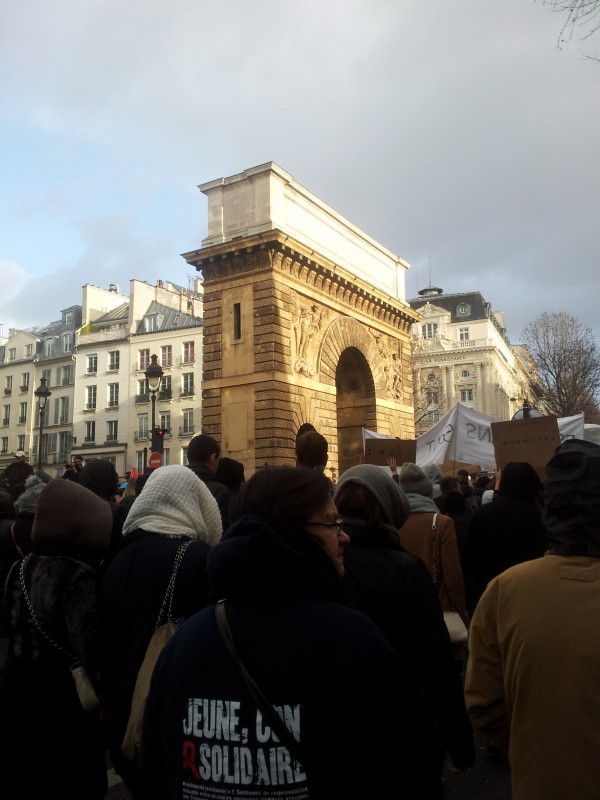
On Sunday, my boyfriend and I went to the Marche Républicaine, the same one you’ve see photographs of, heads of state marching in a straight line across the road. We stood still for two hours before we could even begin marching; we couldn’t move for the throng. I sang the Marseillaise until my throat hurt. We cheered for policemen standing on rooftops.
No one cheers for the French police. At least, no one used to.
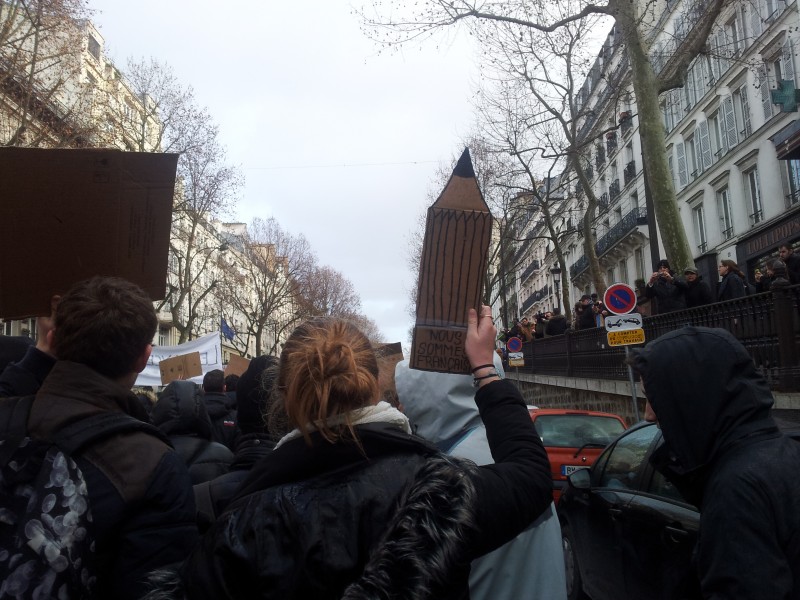
I, for one, had never seen the French rally this way. Sure, there are protests and marches, and they’re fantastic at striking, but I never expected to see quite so many people, so many flags.
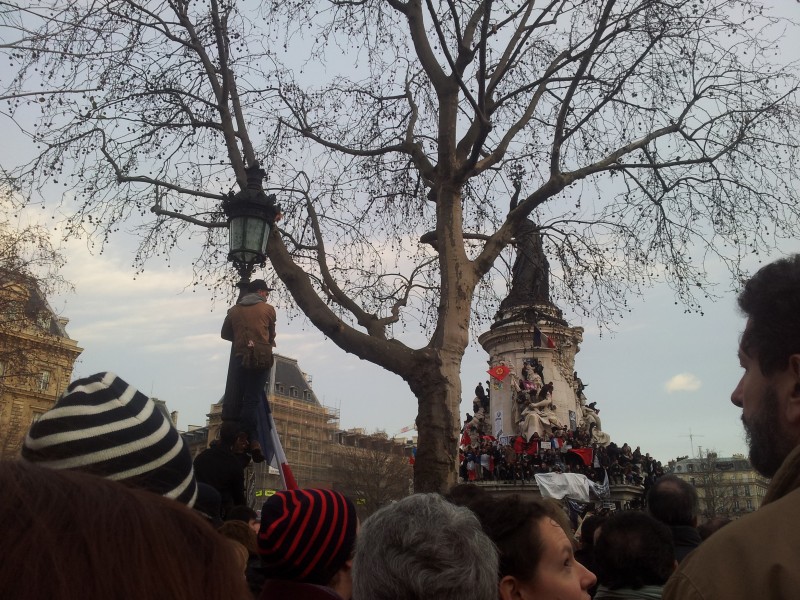
The following week, I tried valiantly to buy my copy of Charlie Hebdo, asking at at least five or six newsstands, always slightly proud when I heard they were already sold out, though I sometimes wondered if I had the right to that pride.
I finally managed to get my hands on one the Tuesday after it was released, six days after publication. My local newsman had promised to put one aside for me, and even though he didn’t get a delivery, he managed to wrap one in Les Echos so that it wouldn’t get stolen.
That was a thing, people were stealing Charlie Hebdo to get their hands on one.
Every morning, coming into work, we talked about how many they were planning to print: 1 million, now 3, now 5, now 7.
I mostly kept my eyes on the flags — they were at half-mast for days.
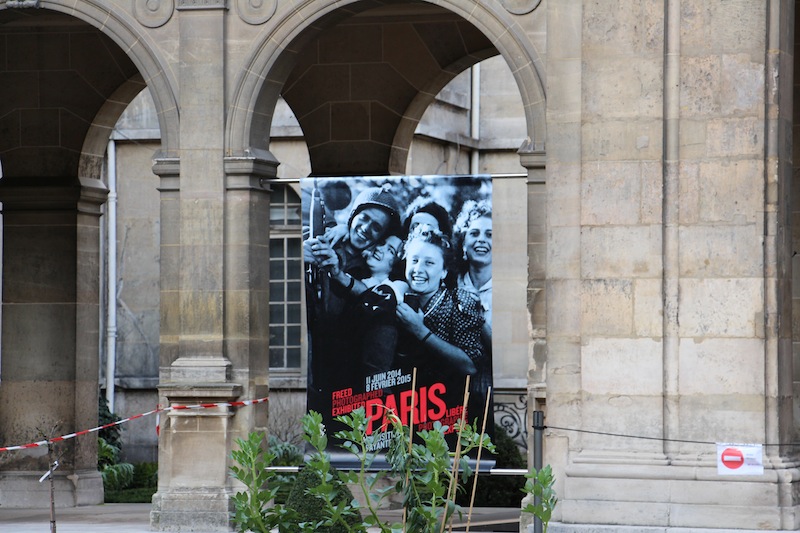
Enough White Flag Stereotypes: Pride in Resistance
I’ve heard the joke a hundred times. “If it weren’t for us, you’d be speaking German.” I may have said it once or twice; I don’t say it anymore. Not after seeing the way that my boyfriend reacted at the Normandy beaches.
It’s strange, how the year that I was learning all about the French Resistance turned out to be the year that I saw France’s spirit come to life, the one that I had thought was lost to fiction, to the past. There are people still living who saw the fervor of the Resistance and the Liberation — I have met them. Victor Hugo may be dead, but Enjolras’ Paris isn’t quite as long gone as I thought.
Last weekend, I went to an exhibit at the Musée Carnavalet, the museum of the city of Paris. I’d been wanting to go for months, long before Charlie Hebdo, but I’m glad I waited.
As I wandered through, my camera regrettably switched off and at my side, I saw images plastered over one another, black-and-white evidence of the world in color I had seen just a few weeks before. Place de la République, empty and fenced in with barbed wire, a sign stating that if you go further, you’ll be shot. What a stark contrast to the relatively peaceful protests of the weeks before at the same place, and yet what a warning — if you go further, you will be shot. Isn’t that what was promised by the terrorist groups who attacked the newspaper?
I see people at windows overlooking the boulevard, holding Molotov cocktails instead of the flags I saw at the march, ready to fling instead of ready to sing. And the newspapers, they’re present too — women on the Place de la Concorde or Invalides, selling German titles with the Nazi flag flying behind them. I know that the important papers were circulating, too, amongst a select few; you can see them in one photograph littering the street, the secret missives amongst the Resistance.
And once the Liberation is over, the New York Herald Tribune, announcing in English what everyone already knows. Did you have to seek out one of those as well, get it wrapped in paper from Le Monde before you could carry it home?
Of course the comparisons must not be pushed too far; that’s something I’m well aware of. I sat in shock as, the night after the march, a local news station played a “recording” of a phone call with the prophet Mohammed and shook my head. I couldn’t speak. I read about the “invisible foreign participants” in the Resistance, the ones who do not figure in the photographs. The expo is keen to mention that there are North Africans amongst them, the way that the French news did about Muslim Frenchmen who marched alongside their fellow citizens, marching against violence, united.
Images of Paris under fire, bodies littering the sidewalk, resemble the horrible images I saw last month, I had to turn off last month. I have to remind myself of the ends sought in each case. Do the ends ever justify the means? And who decides?
And does it matter whether the body on the ground is German or French? Ahmed or Cabu?
The crowds in the streets in these photographs are made up of German soldiers surrendering, their hands clasped over their heads as they march silently. The signs posted on walls and buildings read Kommandantur; jubilance is brought by tearing them down, not putting them up.
In a video interview, Axel Kahn explains that the Liberation united everyone: Communists, Gaullists, Christians. Everyone was present that day. These things help us remember to believe in natural unity, he says.
“Are the traits of this time passed down to us?” He’s talking about epigenesis, about the increased occurrence of diabetes and hypertension amongst babies born in post World War II Holland, but I’ve already ventured elsewhere. Are the traits of this time passed down to us? Are the red and black part of French blood? Do you have to be born here to inherit it, or do traits like these, non-genomic, come through some other vein?
Degaulle leading the victory procession looks like that now oft-photoshopped image of the heads of state. There are no women present, but that’s not photoshopping, not in this case. Some things have changed; some things have not. Sometimes, it’s hard to know what, exactly, is different.

Where Do We Go From Here?
This week, I used “French-born” as an adjective in front of a French person. He balked and called it racist. I’m not saying it’s not — but I am saying that it describes a general feeling that exists here and permeates nearly every conversation, and that’s what I was trying to evoke when using it. Freedom of speech, unless it twists the knife.
When I have the misfortune to be at a table full of French people — French “de souche,” of the stump, of the log, of the root — talking about the immigration “problem,” they always turn to me and say, “but not immigrants like you.” I’m left to wonder what that means. What is “like me” in this context? Not woman, for France still remains extremely patriarchal. That all-male assembly wasn’t so long ago. But is it a reference to my whiteness? My Catholicism? My European background? My nearly unaccented French? I’m integrated, is what they mean. Oh, what a word.
But in the days and weeks that followed the Charlie Hebdo attack, I noticed open discussion for the first time in a long time. People trying to make sense of what had happened, willing to put their personal beliefs on the table to be examined and explored, evoking words they had never thought to define for themselves. Liberty. Equality. Fraternity. They’re printed everywhere, on the fronts of schools and police prefectures, but what do they mean?
I thought I knew. I did, after all, spend two years defining them while completing my Masters. But like in the weeks after 9/11, I found myself in a fog. I got in trouble with my boyfriend for saying that it was important to be responsible with one’s freedom of speech. I got into an hour-long argument at a party, as a man in front of me — completely serious — asked me why, if second-generation immigrants from Algeria hated the French so much, they didn’t just go back and rebuild the country the colonists had destroyed.
I knew where I stood, or at least I thought I did.
Everything seemed to be spinning out of control, and the roadmap I had, the one I’ve cultivated over years of American values and American media, in spite of my French address, betrayed me — my French may have been unaccented, but my opinions were foreign.
I had found it easy to be an authority on the 19th century, even as a foreigner; after all, that history is past. This history is happening before our eyes. I’m watching it. I’m bathing in it. But I’m separated by a gossamer curtain, a veil between me and France. No matter how long I seep in it, it isn’t fully mine.
By Emily Monaco
Also Check Out:
Why I Waited 8 Years To Visit The Normandy Beaches
When American Barbecue Invades The European Kitchen
French Food Culture: The Illustrious History Of The Croissant
Emily Monaco
Latest posts by Emily Monaco (see all)
- Top 10 Prague Pastries To Try On Your Next Czech Republic Trip - Dec 20, 2023
- Unusual Budapest: Childhood Memories & Sweet Treasures At The Marzipan Museum - Sep 8, 2016
- How The Tomato Transformed The European Diet - Jan 9, 2016
- Is Himitsu The Secret To Atlanta’s Burgeoning Cocktail Scene? - Dec 28, 2015
- The French Influence On Vietnamese Cuisine - Dec 16, 2015

